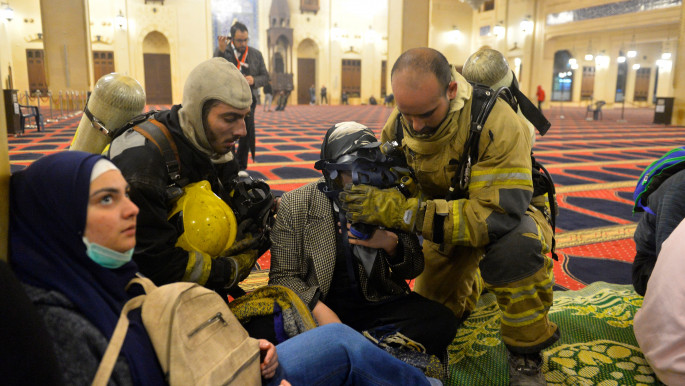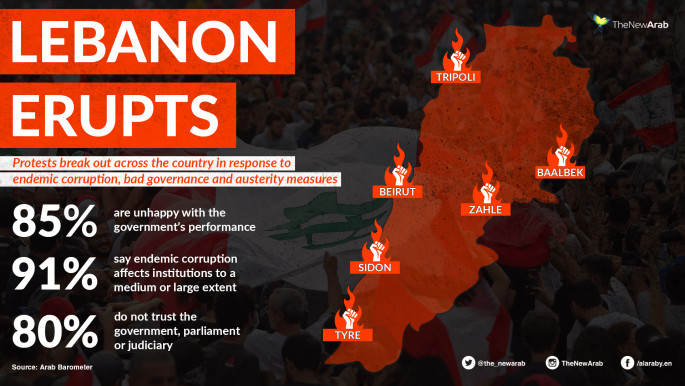‘Stop wasting time’ in government talks, says Lebanon’s Hariri amid brutal crackdown on protesters
‘Stop wasting time’ in government talks, says Lebanon’s Hariri amid brutal crackdown on protesters
Saad al-Hariri has come out and said politicians need to stop delaying and form a new government as protests intensify.
3 min read
Hariri wants an end to the protests [Getty]
Lebanon’s Saad al-Hariri on Sunday urged politicians to urgently form a new government and find solutions for the country’s economic crisis, after a night of increased violence by security forces left more than 400 protesters injured.
“There is a roadmap to calm the popular storm. Stop wasting time, form a government, open the door to political and economic solutions,” tweeted Hariri, who resigned as prime minister in October under pressure from a wave of protests.
“To keep the army, security forces and protesters in a state of confrontation is to circle inside the problem,” he said.
Lebanon’s president Michel Aoun is set to meet with top security officials to discuss the violence over the weekend.
Aoun will be joined by care-taker ministers of the interior and defence as well as the chiefs of the military and security agencies on Monday afternoon.
 |
| Protesters treated in mosque as violence by authorities intensifies [Getty] |
It also addresses “measures that need to be taken to preserve peace and stability,” the state-run National News agency (NNA) reported.
Demands for a new government
Meanwhile, human rights organisations and lawyers have condemned the “excessive” and “brutal" use of force by security forces as journalists continued to face arrest amid the growing violence.
A video that circulated on social media depicting police officers beating up protesters is being investigated by security forces, but critics say this isn’t enough.
Human Rights Watch accused riot police of “launching tear gas cannisters at protesters’ heads, firing rubber bullets in their eyes and attacking people at hospitals and a mosque.”
The United Nations' envoy to Lebanon pinned the blame for the violence on politicians.
"Anger of the people is understandable, but it is different from vandalism of political manipulators, that must be stopped," Jan Kubis wrote on Twitter on Saturday.
In Lebanon’s cities protests have reached their zenith as tens of thousands took to the streets in anger over delays in forming a new cabinet to address the country’s growing economic crisis.
No progress seems to have been made on a final lineup, and it is unclear if the meetings with Aoun will yield satisfactory results for the protesters, who demand that a collection of independent experts free from traditional political party lines tackle the crisis.
Last week demonstrators briefly blocked roads in Beirut and the city of Tripoli to make a stand. “We blocked the road with cars because it’s something they can’t move,” Marwan Karam, a protester, said at the time.
 |
Carlos Yammine, 32, said he did not want another “cake-sharing government”.
“What we have asked for from the start of the movement is a reduced, transitional, emergency government of independents,” he added.
The protest movement is in part fuelled by the worst economic crisis that Lebanon has witnessed since its 1975-1990 civil war.
The protests this week saw angry demonstrators attack banks following the imposition of sharp curbs on cash withdrawals to stem a liquidity crisis.
The World Bank has warned that the poverty rate in Lebanon could rise from a third to a half if the political crisis is not remedied fast.

![Palestinians mourned the victims of an Israeli strike on Deir al-Balah [Getty]](/sites/default/files/styles/image_684x385/public/2024-11/GettyImages-2182362043.jpg?h=199d8c1f&itok=xSHZFbmc)


![The law could be enforced against teachers without prior notice [Getty]](/sites/default/files/styles/image_684x385/public/2178740715.jpeg?h=a5f2f23a&itok=hnqrCS4x)
 Follow the Middle East's top stories in English at The New Arab on Google News
Follow the Middle East's top stories in English at The New Arab on Google News

![Palestinian journalists in West Bank [Getty]](/sites/default/files/styles/image_330x185/public/2167088057.jpeg?h=a5f2f23a&itok=smdkN-46)
